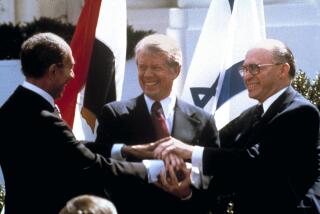The Pressure Is On to Play the Oil Card
- Share via
Nearly 30 years ago, the Arab oil-producing countries in the Middle East first used oil as a weapon against Israel, the U.S. and their allies. The 1973 OPEC oil embargo, which came on the heels of the Yom Kippur War between Israel and its Arab neighbors--Egypt and Syria--rocked the post-World War II global order. Oil prices quadrupled, motorists waited in long lines at filling stations and the global economy began to slide into a prolonged recession. Can this happen again?
Certainly, there will be threats. On Monday, Iraqi President Saddam Hussein announced that his country was suspending the export of its oil for 30 days or until Israel ends its incursion into Palestinian territories. But Saudi Arabia--OPEC’s largest producer--says it opposes using oil as a weapon and, on Tuesday, announced that it will ensure that consuming nations have enough supply to make up for the losses caused by Iraq. Iraq is the sixth-largest oil supplier to the U.S., providing about 9% of U.S. oil imports.
Yet Saudi reassurances might not be the end of it. Both Iran and Libya announced that they would support an oil embargo if other Arab countries agreed to go along with the Iraqis.
Meanwhile, oil prices have risen dramatically in the past five months since the violence escalated between Israel and the Palestinians.
For now, the prevailing wisdom on the street is that there is “a very low possibility” that other Arab oil producers would cut oil supplies to exert pressure in Israel and the U.S. Still, as Hussein’s move on Monday demonstrates, things could change quickly, and the consequences could be profound and far-reaching.
While in the short run Russia, Norway, Canada, Mexico and other non-OPEC oil producers also could ramp up production to keep oil flowing to the West, even the partial withdrawal of OPEC oil from world markets could send the price of oil soaring. Were that to happen, it would trigger a devastating downturn in the global economy, hitting developing nations the hardest.
Recall that it was the rise in oil prices in the 1970s and 1980s that was a major cause of the escalating debt crisis in Third World countries. Unable to afford the high price of oil on world markets, developing nations were forced to secure billions of dollars in commercial and institutional loans to pay for more expensive oil imports and the increasing cost of all the other activities associated with higher oil bills.
A widespread oil embargo could plunge many developing countries into an economic abyss from which they might not be able to recover.
How likely is it that Arab oil-producing countries might impose restrictions on the flow of oil, even if it meant a drop in revenue for their own governments?
Much depends on how powerless and desperate they feel in the wake of the increasing violence between Israel and the Palestinians. If the Arab governments conclude they have no other avenue available to them, oil might become the weapon of last resort.
Then too, if younger Islamic fundamentalists in the Middle East and around the world escalate demands against the Saudis and other Arab producers to use the oil card as a weapon, and if they begin to take to the streets in large numbers, as they already have in Iraq, chanting “Arab oil for the Arabs,” the pressure might become too serious for their governments to ignore.
Many younger Muslim fundamentalists view oil as “a soft loan from Allah.” They see oil as the great equalizer, a spiritual as well as geopolitical weapon that, if Islamized in the service of Allah, could lead to the second coming of Islam.
King Fahd of Saudi Arabia sensed as much in the aftermath of the oil shock of the 1970s and early 1980s, and he told his fellow Muslims that “the main resource to depend upon after God is oil.” Radical Muslims like to point out that 10 of the 13 OPEC nations are Islamic states.
While hardened geopolitical analysts in the West snicker at the idea that Allah bestowed such a gift on the upholders of the faith, no one dares laugh when Osama bin Laden urges his followers around the world to reclaim the Saudi holy land, establish a universal Islamic state and raise the price of oil astronomically.
The story of oil gives credence to the idea that what goes around eventually comes around. Oil, the energy that helped make the West the unchallenged economic, political and cultural force in the world in the 20th century, could become its undoing at the hands of an Islamic world determined to turn the tables and restore its former status as the world’s spiritual and cultural arbiter. Of this much we can be sure: Oil and Islam are inseparably linked. The fate of one will, to a great extent, determine the fate of the other.
*
Jeremy Rifkin is the author of the forthcoming book “The Hydrogen Economy: The Creation of the Worldwide Energy Web and the Redistribution of Power on Earth” (Tarcher Putnam, September 2002).
More to Read
Sign up for Essential California
The most important California stories and recommendations in your inbox every morning.
You may occasionally receive promotional content from the Los Angeles Times.










